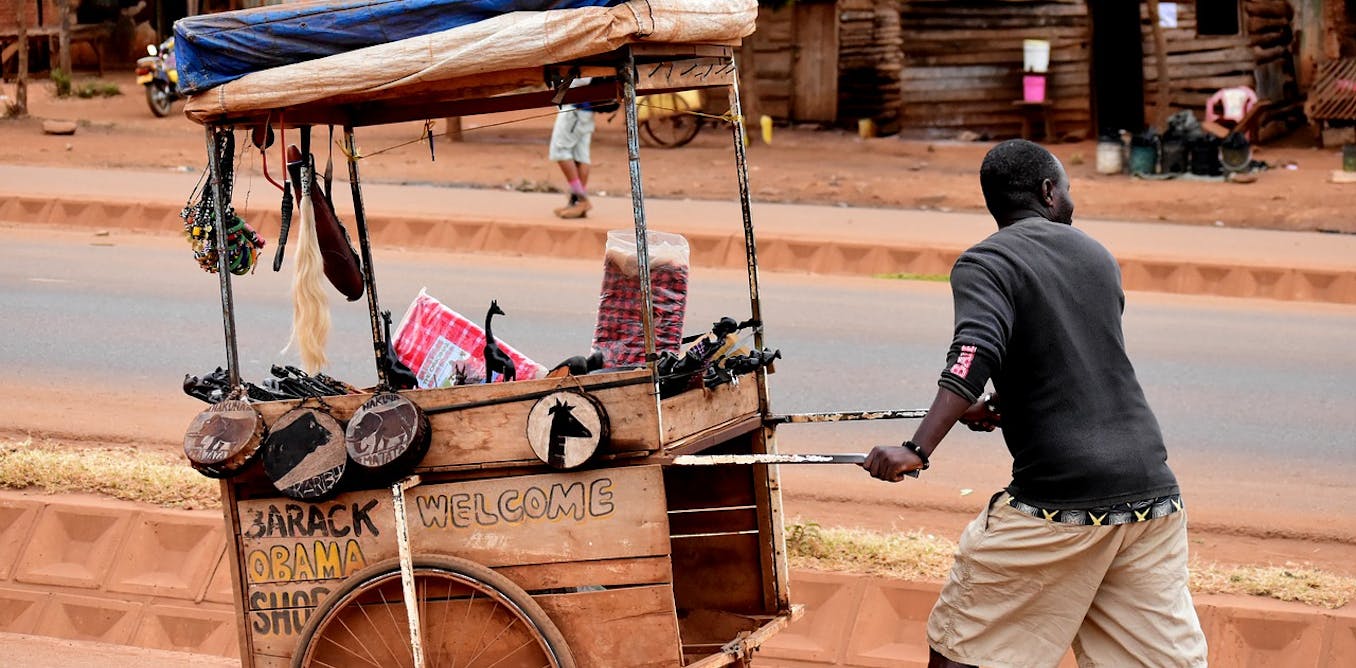Moving to the city is a common strategy for the rural poor in the global south. Economic hardship pushes individuals out of their rural communities in search of opportunities. These tend to be found in urban centres, where facilities and services are concentrated.
The World Migration Report indicated that 740 million people were migrants in their own country in 2009.
Even in the city, there’s no guarantee of finding a job. Many people therefore resort to informal ways of making a living, like street vending. In Ghana, about 80% of the workforce are employed in the informal sector.
We were among a group of urban planning researchers who recently studied the role of street vending in the lives of migrants in Ghana’s capital, Accra. In most African cities, between 2% and 24% of informal workers are street vendors.
Our study showed that street sales were a source of jobs, income and survival for the urban poor in Ghana. This is even though street vending is illegal in the country.
We also assessed the effects of street vending from the lens of city authorities. Over the years, city authorities have failed to manage the activities of street vendors. Understanding all the relevant perspectives may help to find ways to meet people’s various needs in Ghanaian cities.
Street vendors in Accra
The study focused on street vending activities in the central business district of Accra Metropolis. The area was selected due to the concentration of street vending activities such as the sale of hardware goods, electrical appliances, cosmetics, clothing, food and beverages, and the activities of financial institutions.
We interviewed 80 migrant street vendors and some city authorities. In assessing the socio-economic effects of street vending on the livelihoods of migrants, we monitored key livelihood indicators:
-
income
-
access to social services (education and healthcare)
-
asset acquisition (property such as land)
-
social ties
-
educational assistance (helping relatives in their education)
-
family relationships.
We found that a majority (60%) of the participants used to earn a monthly income of less than GH₵50.00 (US$4) before they took up street vending. After moving to Accra and entering into street vending, 72% of the respondents indicated that they earned over GH₵200 (US$16).
Over a third (68%) of the respondents indicated that their access to social services such as education, healthcare and recreational facilities had improved since migrating from their place of origin and starting street vending. This could be a result of the increased income coupled with the presence of social facilities and services in urban centres.
Half (50%) of the respondents had not acquired any assets for their family members since they started street vending. However, the other 50% had been able to acquire assets for their family members in their home of origin. These assets included land for residential and agricultural purposes.
Also, 58% of the respondents indicated that street vending enabled them to support family members’ education back home.
Most of the vendors said they were selling on the streets because they had limited skills. And the cost of living was high in the city.
The challenges they faced included:
-
limited access to shelter
-
risk of arrest by city authorities (street vending is illegal in the capital)
-
limited access to food and related consumer items
-
inability to access social services by some street vendors
-
cultural shock and cultural difference.
The city’s view
City officials who took part in the research highlighted the challenges street vendors posed. These included:
-
getting in the way of pedestrians and vehicles
-
forcing pedestrians to walk on the streets, increasing their chances of accidents
-
littering, which has environmental consequences and increases the cost of waste management.
The city authorities indicated that the most sustainable approach to managing the activities of street vendors was to allot portions of the pavements to them. One strategy suggested was to block specific roads on specified days to allow street vendors to sell their wares.
The Metropolitan Assembly bye-law states that there should be no hawking by street vendors. The assembly monitors their activities and sometimes evicts them.
These management strategies are expensive and ineffective. Authorities lack political will to enforce them. Most mayors allow street vendors to operate without restrictions during election years.
Next steps
Street vendors believe their activities are legitimate and present social and economic opportunities. For example, they believe they can make a living and support their families by vending. They say relocating to Accra has strengthened their livelihoods and improved their access to healthcare services and other social facilities.
On the contrary, city authorities see street vending as an illegal activity that poses environmental threats to the city. They associate it with problems such as obstruction to pedestrians and vehicles, littering and petty crime.
Our study concludes that halting street vending without alternative livelihoods will mean denying thousands of people their livelihood.
Over the years, government skills training and growth interventions have excluded informal sector actors such as street vendors. The only way to get the vendors off the streets is to offer alternative sources of livelihood that will provide competitive income.
We propose that policymakers design skills training programmes for street vendors that will offer them sustainable and improved livelihoods. These programmes should be designed and carried out in a politically neutral way.
Also, institutions such as the Ministry of Roads and Highways, Transport Ministry, National Development Planning Commission and local authorities should incorporate the activities of street vendors in the design of layouts, roads, plans and policies.










